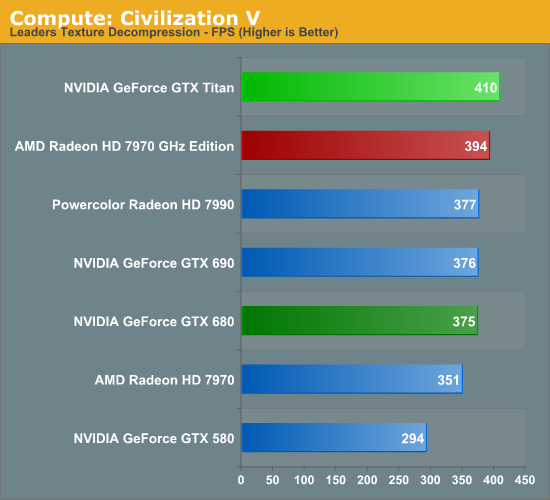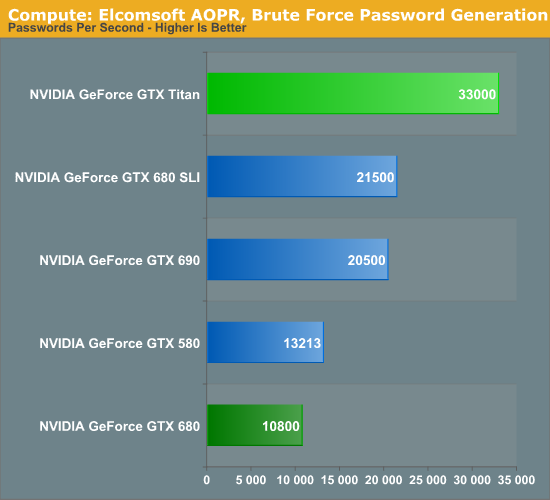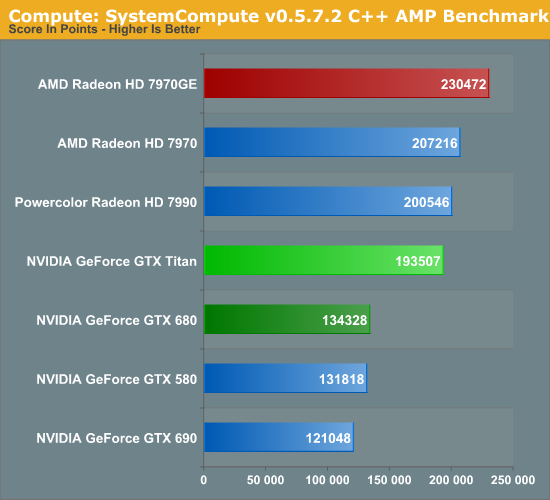NVIDIA’s GeForce GTX Titan Review, Part 2: Titan's Performance Unveiled
by Ryan Smith & Rahul Garg on February 21, 2013 9:00 AM ESTTitan’s Compute Performance, Cont
With Rahul having covered the basis of Titan’s strong compute performance, let’s shift gears a bit and take a look at real world usage.
On top of Rahul’s work with Titan, as part of our 2013 GPU benchmark suite we put together a larger number of compute benchmarks to try to cover real world usage, including the old standards of gaming usage (Civilization V) and ray tracing (LuxMark), along with several new tests. Unfortunately that got cut short when we discovered that OpenCL support is currently broken in the press drivers, which prevents us from using several of our tests. We still have our CUDA and DirectCompute benchmarks to look at, but a full look at Titan’s compute performance on our 2013 GPU benchmark suite will have to wait for another day.
For their part, NVIDIA of course already has OpenCL working on GK110 with Tesla. The issue is that somewhere between that and bringing up GK110 for Titan by integrating it into NVIDIA’s mainline GeForce drivers – specifically the new R314 branch – OpenCL support was broken. As a result we expect this will be fixed in short order, but it’s not something NVIDIA checked for ahead of the press launch of Titan, and it’s not something they could fix in time for today’s article.
Unfortunately this means that comparisons with Tahiti will be few and far between for now. Most significant cross-platform compute programs are OpenCL based rather than DirectCompute, so short of games and a couple other cases such as Ian’s C++ AMP benchmark, we don’t have too many cross-platform benchmarks to look at. With that out of the way, let’s dive into our condensed collection of compute benchmarks.
We’ll once more start with our DirectCompute game example, Civilization V, which uses DirectCompute to decompress textures on the fly. Civ V includes a sub-benchmark that exclusively tests the speed of their texture decompression algorithm by repeatedly decompressing the textures required for one of the game’s leader scenes. While DirectCompute is used in many games, this is one of the only games with a benchmark that can isolate the use of DirectCompute and its resulting performance.
Note that for 2013 we have changed the benchmark a bit, moving from using a single leader to using all of the leaders. As a result the reported numbers are higher, but they’re also not going to be comparable with this benchmark’s use from our 2012 datasets.

With Civilization V having launched in 2010, graphics cards have become significantly more powerful since then, far outpacing growth in the CPUs that feed them. As a result we’ve rather quickly drifted from being GPU bottlenecked to being CPU bottlenecked, as we see both in our Civ V game benchmarks and our DirectCompute benchmarks. For high-end GPUs the performance difference is rather minor; the gap between GTX 680 and Titan for example is 45fps, or just less than 10%. Still, it’s at least enough to get Titan past the 7970GE in this case.
Our second test is one of our new tests, utilizing Elcomsoft’s Advanced Office Password Recovery utility to take a look at GPU password generation. AOPR has separate CUDA and OpenCL kernels for NVIDIA and AMD cards respectively, which means it doesn’t follow the same code path on all GPUs but it is using an optimal path for each GPU it can handle. Unfortunately we’re having trouble getting it to recognize AMD 7900 series cards in this build, so we only have CUDA cards for the time being.

Password generation and other forms of brute force crypto is an area where the GTX 680 is particularly weak, thanks to the various compute aspects that have been stripped out in the name of efficiency. As a result it ends up below even the GTX 580 in these benchmarks, never mind AMD’s GCN cards. But with Titan/GK110 offering NVIDIA’s full compute performance, it rips through this task. In fact it more than doubles performance from both the GTX 680 and the GTX 580, indicating that the huge performance gains we’re seeing are coming from not just the additional function units, but from architectural optimizations and new instructions that improve overall efficiency and reduce the number of cycles needed to complete work on a password.
Altogether at 33K passwords/second Titan is not just faster than GTX 680, but it’s faster than GTX 690 and GTX 680 SLI, making this a test where one big GPU (and its full compute performance) is better than two smaller GPUs. It will be interesting to see where the 7970 GHz Edition and other Tahiti cards place in this test once we can get them up and running.
Our final test in our abbreviated compute benchmark suite is our very own Dr. Ian Cutress’s SystemCompute benchmark, which is a collection of several different fundamental compute algorithms. Rahul went into greater detail on this back in his look at Titan’s compute performance, but I wanted to go over it again quickly with the full lineup of cards we’ve tested.

Surprisingly, for all of its performance gains relative to GTX 680, Titan still falls notably behind the 7970GE here. Given Titan’s theoretical performance and the fundamental nature of this test we would have expected it to do better. But without additional cross-platform tests it’s hard to say whether this is something where AMD’s GCN architecture continues to shine over Kepler, or if perhaps it’s a weakness in NVIDIA’s current DirectCompute implementation for GK110. Time will tell on this one, but in the meantime this is the first solid sign that Tahiti may be more of a match for GK110 than it’s typically given credit for.










337 Comments
View All Comments
rcabor - Thursday, February 21, 2013 - link
Why is the voltage higher at 996MHz to 992MHz? Is that a typo?rcabor - Thursday, February 21, 2013 - link
meant 966 MHz not 996 MHzRyan Smith - Thursday, February 21, 2013 - link
Bingo. Fixed. Thank you.=)HollyDOL - Thursday, February 21, 2013 - link
Hi,it seems a typo sneaked at voltages mentioned (page 2) at the three working frequencies tightly below 1GHz speed... should say 1.1625 (I guess) but says 1.625V for example. 1.625 also appears in text, not just the table.
just4U - Thursday, February 21, 2013 - link
I am interested in these luxury coolers for some of their lower end GPU's. I don't know what they cost but I'd pay a premium for it if it wasn't to far out there..BrokenCrayons - Thursday, February 21, 2013 - link
Viewed outside fo consideration for the cost, it's quite impressive. Inexpensive (relatively) GPU compute seems like its focus which makes sense given the original design intentions. On the gaming side of the equation, the performance benefits don't stack well against the costs. A 680 or 7970 seems like a much more reasonable purchase unless the whole intention is for fairly pointless bragging rights to people that don't care, won't understand the significance, or are just random sorts you ramble to on the Internet about how much money you can afford to drop on a GPU which only returns the ability to waste time playing games at higher end display settings. So yeah, the performance is interesting, but the price puts it firmly into the "yeah whatever" territory of gaming.-BC
Hood6558 - Thursday, February 21, 2013 - link
This is another piece of the puzzle I call my Ultimate Dream Machine, in which every component is the best or fastest available. It joins such parts as the i7-3970X, Asrock X79 Extreme11, Corsair 900D, Corsair Dominator Platinum 64 GB kits, and Corsair AX 1200i. I'll probably never have the money to build it, but that's okay, the dream is sometimes better than the reality. Anyway by the time I build it all the above parts will be obsolete, slow museum pieces, and the new stuff will be 10 times faster.silverblue - Thursday, February 21, 2013 - link
What's going on with the 7970's framerate in Crysis: Warhead's 1080p E Shaders/G Quality tests? It's massively behind the 7970GE.Also, the minimum framerate table for Crysis: Warhead appears to have been placed on top of the Far Cry 3 page in addition to the bottom of the Crysis: Warhead page.
Ryan Smith - Thursday, February 21, 2013 - link
I'll have to look into that and get back to you. It's not a transcription error, so it may have been a configuration error on the benchmark.JlHADJOE - Thursday, February 21, 2013 - link
1/3 FP64 is awesome. This is a bargain if you need the compute.If you wanna play games on it... not so much. =P